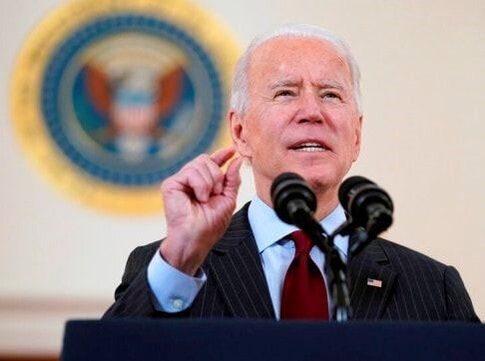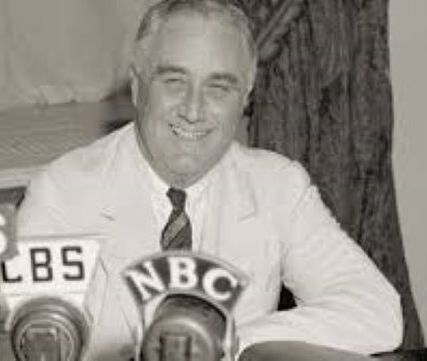 Watching Biden Watching Biden The President of the United States leaned forward, to speak to a nation, maybe even a world. This much he knew, he said. We will get through this. He was speaking at the White House Monday to honor 500,000 Americans who have died, so far, in the pandemic. He was speaking like a parent, like a leader, like a healer. “I know it’s hard, I promise you. I know it’s hard, I remember,” Biden said. “That’s how you heal, you have to remember. It is also important to do that as a nation. To all those who have lost loved ones, this is what I know: They’re never truly gone. They will always be part of your heart.” Everybody knows about his losses – a first wife and a young daughter, a grown son. And he seemed to know about their losses, all half a million. “This seems unbelievable, but I promise you, the day will come, when the memory of the loved one you lost will bring a smile to your lips before a tear to your eyes…I pray for you that day will come sooner rather than later.” This reassurance was unlike anything the United States, the entire world, had heard from a President in the previous four years. No need to elaborate or explain -- just that he cared. During this speech, I had a flashback, to my earliest memories, when my parents and grandmother would turn off the lights and put up dark shades over the windows, in case of a bombing raid. And when my family was reassured by the same crackling voice on the radio that had sustained people during the Depression.  Thinking of FDR Thinking of FDR Franklin Delano Roosevelt did it like the patrician he was. Joe Biden is a man of the working people. But nobody has quite aimed for the heart of the collective "we" as FDR did. My mother cried the day FDR died in 1945. She had lost her father to an auto accident as she entered her teens. FDR came along a few years later. Now Joe Biden is trying his imperfect best to be a leader to this fractured country. He says there are no Republicans, no Democrats, in this fight against the Covid virus. Biden has been taking on stature since Rep. Jim Clyburn rescued him from the snowbanks of Iowa and New Hampshire, and presented him to the hearts of Black voters, not just in South Carolina but all over. This was more than a political move; it was a move of faith. Now Biden speaks to everybody who will listen, not about him, but about them. He is elderly, and he speaks as an elder. "You're gonna be okay. You're gonna be okay." After presiding over a moment of silence in front of thousands of lit candles, outside the White House, Biden returned past the military guards, into his new home. His shoulders seemed to be sagging from the pain of all those deaths, but Jill Biden would occasionally touch him, so tactile, so caring. And through the window the TV camera picked up Doug Emhoff, the big-time lawyer and husband of Vice President Harris, putting his hand on Joe Biden’s right shoulder, patting him, several times, reassuring the healer. * * * And speaking of dignity, Merrick Garland was interviewed by the Senate Monday, regarding his nomination for Attorney General. This is the man who was shafted – as was the entire nation – by Mitch McConnell in the final year of the Obama regime, keeping Garland from the Supreme Court. Now Garland was speaking of the values he would bring to the Attorney General. Without mentioning the servile Bill Barr, the previous attorney general, Garland emphasized that he would be serving the country, not the President. He is clearly a man of intellect and character. We have real people, people who feel. All of us are being liberated. * * * (President Biden's speech. The most wonderful part is around 6;00.) The headline above was texted by a family member during the Inauguration, on our little round-robin message board that has tied eight adults together for the four past ugly years. I personally was trying to find some way to comment here on the spiritual optimism of President Biden and the uplifting composure of the “dignitaries” and the stunning talent of the young poet and the truly American mix of the celebrants. They all provided inspiration….and I was letting it sink in….when I opened the group email from my Jamaica High School friend, the great Letty Cottin Pogrebin. As always, Letty has been ahead of the rest of us, writing: I intended to post nothing but good news on this, the day that will see simple decency return to public life and discourse in the person of President Joe Biden, and history being made by Vice President Kamala Harris. (But today's euphoria can't erase the conflagration of Jan 6th and the shameless-who-shall-be-nameless #45 who lit the fuse.) Letty included the Youtube bit from James Corden that, she says, “has gone viral.” It ends with one thoroughly cathartic act by Corden. Letty's websire: http://www.lettycottinpogrebin.com/ I am taking leave for the day, to watch the reruns of the Inauguration that might, just might, start to fumigate the past four years. * * * Your thoughts? Comments welcome, indeed, beseeched. * * * On that note, introducing Amanda Gorman, not yet 23, the youngest poet ever to grace an inauguration: Watching this brilliant young writer recite her poem in the bright sunlight, I thought back to the misfortunate weather-blinded Inaugural speech by Robert Frost in 1960, with new President Kennedy right behind him. What a contrast.
https://www.youtube.com/watch?v=XInL2u0DP88 Later on Wednesday, I was sent a video of President Kennedy’s last speech, at a Frost event at Amherst College. Mentioned in the video is Our Man in El Salvador, Gene Palumbo, who was a senior that year, and is now a journalist in Latin America. https://concordmuseum.org/events/film-screening-of-jfk-the-last-speech/ |
Categories
All
|









